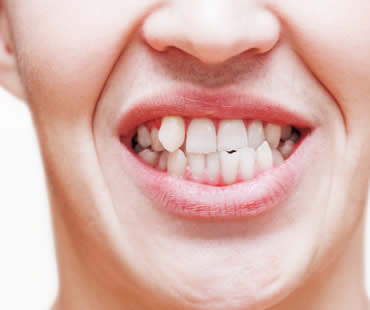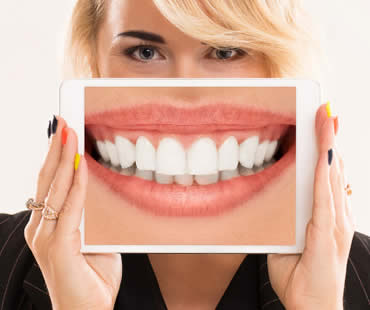Jan 4, 2019 | Dental Topics 2, Implant Dentistry, Blog
Dental implants can last a lifetime with proper care. Like natural teeth, dental implants require vigilant oral care to maintain their usefulness and prevent problems. Once the implant has fused to the jaw bone, it is important to follow some general guidelines to ensure the continued success of your dental implant and restoration.
A condition known as peri-implantitis is a common cause of implant failure. This occurs when an accumulation of plaque leads to damage of the tissues and infection of the bone around the implant. While the implant itself is not susceptible to decay, if plaque is not removed with thorough brushing and flossing at least twice per day the resulting periodontal disease can lead to implant failure.
Your dental professional may also recommend the use of additional oral hygiene products such as special brushes or oral irrigation devices to aid in the removal of food debris and plaque around the areas of the implant supported restorations. Your dentist or hygienist can assist in teaching you to utilize these devices to improve your implant care.
Regular dental visits and examinations are vital to detect and prevent any issues that may present problems for your dental implants. Expect to visit your dentist every 3 months for the first year after implant placement, and then every six months for the life of your implants. Your dentist will also provide special care instructions if your implants are being used to support a removable denture. It is important to know how to place and remove the appliance without causing damage to either the denture or your implant.
Avoid applying excessive pressure or eating hard foods that could cause damage to the restoration and implant area. If you suffer from conditions like teeth grinding or clenching, discuss with your dentist the option of being fitted for a night guard to prevent the problems these habits can cause your implants. Taking excellent care of your oral health will help to ensure years of dental implant success.
If you live in the Conyers area contact us today

Mar 20, 2025 | Dental Topics 3, Dental Information, Blog
Do you wince when you take a bite of something hot, cold, or sweet? If so, you may be one of the millions of Americans experiencing sensitive teeth. This issue can impact your quality of life, causing you to limit the foods and beverages you enjoy.
Sensitivity in teeth occurs when dentin, the middle layer, is exposed. Usually, your gums cover the dentin, which contain tiny tubules that house the nerve branches leading to the nerve center of the tooth. If the dentin is uncovered, your tooth, or teeth, becomes sensitive.
Several factors can bring about tooth sensitivity, including:
- A worn out filling
- Cavities that need treatment
- Grinding your teeth
- Improper brushing that can wear down the enamel
- Poor oral home care, which allows tartar build up
- Receding gums
- Whitening your teeth
Sometimes, people experience pulpal sensitivity, which generally affects a single tooth and occurs because of damage to the pulp, or nerve center. Because the symptoms can be similar to general tooth sensitivity, your dentist will need to examine your teeth and possibly get an X-ray to determine if you have any decay.
For general sensitivity, you can take several steps at home, including gently brushing teeth, using a soft brush, selecting fluoride toothpaste, and getting treatment for teeth grinding. Your dentist may also recommend toothpaste specifically designed to lessen sensitivity in teeth. Treatment for pulpal sensitivity usually involves removal of decay and/or root canal therapy.
Schedule a dental cleaning appointment today at our Conyers dental office.

Feb 6, 2025 | Dental Topics 3, Family Dentistry, Blog
Dentists recommend seeing children for the first time when they have begun to cut teeth, by the time they have celebrated a first birthday. A first visit is primarily about allowing a child to get comfortable in the dentist’s chair and about educating you, the parent, on how to care for your child’s baby teeth. Most children who visit at this age will not remember the visit, but it will lay the foundation for positive experiences in the dental chair in the future.
Once children reach the approximate age of 5, they will have their first set of X-rays taken. The family dentist will review them to look for cavities between the teeth and to check proper development of dormant permanent teeth.
As children age, between 6 and 12 years, they will lose their baby teeth and permanent teeth will begin to erupt. At this time, your family dentist may recommend a tooth sealant. This plastic resin bonds to the “flat” chewing surface of a tooth, protecting it from debris and decay in the crevices.
Your family dentist may also give your child an orthodontic evaluation. Most pediatric patients begin orthodontics once all of their permanent teeth have erupted; however, some patients benefit from staged orthodontics and can begin treatment much sooner.
If your child has been seeing a dentist since infancy, introducing the child to the dentist isn’t an issue; your child already knows and trusts your family dentist. If you are bringing your child to the dentist for the first time as a toddler or kindergarten student, you should plan to spend some time talking about what to expect.
Many times, having parents sit in the dental chair and then hold their child on their laps is very comforting to the patient. Your family dentist has experience in dealing with fearful or anxious children and will know what to do in each case. Often, videos or music are employed to relax young patients.
You can trust your family dentist with each member of your family, no matter what the age. Talk to your family dentist today with any questions you may have about your child’s first dental appointment.
If you live in the Conyers area contact us today

May 26, 2023 | Dental Topics 3, Cosmetic Dentistry, Blog
A set of crooked teeth can make you self-conscious in interacting with others and may cause you to hide your smile instead of showing your emotions with confidence. There are many reasons that you might have misshapen or misaligned teeth. Decay, cavities, poor development or nutrition, hereditary factors, or bad habits like teeth grinding or tongue thrusting can all play a role. If you have a crooked smile for any reason, a smile makeover may be the perfect answer.
A dentist can provide many options for correcting misaligned teeth, and the best methods depend on the degree of your issues. Every patient is different and can benefit from varying techniques.
The most well-known way to correct crooked teeth is probably orthodontics. Traditional metal braces have been around for many years and are a proven way to straighten teeth and realign jaws. Braces involve attaching metal brackets and wires to the teeth with glue, and tightening them at regular intervals over a period of time that can last up to a couple of years or more. Because many patients dislike the look and hassles of metal braces, Invisalign has been developed to straighten teeth without such an obvious impact to your appearance while undergoing treatment. These invisible, removable, plastic aligners provide a popular way to straighten smiles.
Another choice for improving your smile is dental veneers. These very thin shells made of porcelain or ceramic can be bonded to the fronts of your teeth to hide flaws underneath. Veneers create a natural look that is in the shade you desire, and quickly transform your smile into the one you’ve always wanted.
Minor changes to crooked teeth can be made with simple reshaping of teeth. Gentle abrasion and polishing of the teeth can make them appear straighter and more attractive. Reshaping may be combined with bonding, which involves applying resin to the tooth and sculpting it to the desired look. These are both very quick and painless ways to improve your smile.
If you live in the Conyers area contact us today
Dec 28, 2018 | Dental Topics 2, Kids Dentistry, Blog
In many households, the bedtime routine is no fun. One of the trickiest parts for some parents is getting their kids to brush their teeth. However, it’s not a part of your child’s routine that should be skipped. To help make taking care of their teeth fun for children, here are some ideas for parents.
Toothbrushes
Provide your kids with fun toothbrushes! By choosing a brush decorated with their favorite character or color, your children will think of their toothbrush more like a toy than a dental tool. Consider getting more than one toothbrush, so each night they can choose the one they want to “play” with at the time.
Toothpaste
Children are picky about their toothpaste flavors just like their foods. Select toothpaste that you know your kids will like. Some of the flavor options include bubble gum and fruits, as well as the standby mint.
Floss
If they start flossing at a young age, your kids will likely view it as part of their oral hygiene routine all of their life. Try using some of the fun flossing tools on the market today, because they may help get your child interested in flossing. There are many colors and shapes to choose from, so keep trying until you find one that motivates your child.
Rewards
Enticing your children with rewards is often an easy way to encourage them to perform a task without arguing. Consider making a rewards chart and giving them a sticker each time they brush and floss. By the end of a week filled with good dental hygiene, a special reward will await them!
Our dental office is located in Conyers

Mar 17, 2023 | Dental Topics 3, Dental Information, Blog
White teeth are a sign of beauty and health. Having pearly whites shows that you take pride in your appearance and gives you a confident air. There are many ways to achieve a brighter smile; here are some tips to help you get that shiny glow.
Professional whitening is a sure-fire way to brighten your smile by numerous shades. In only an hour, your smile can go from dull and dingy to white and polished. Your dental professional can guide you in the best ways to enhance your look with tools such as lasers or whitening trays. Professional methods are the quickest route to a dramatic improvement in the shade of your teeth.
If you prefer methods in your own home, drugstores have lots of options. Whitening strips, gels, and toothpastes are only a few of the choices available. These typically require consistent use for an extended period, but they can improve the color of your teeth with proper use. Follow the instructions carefully for the best results.
There are also natural ways to whiten your teeth at home. Rubbing your teeth with the back of a lemon or orange peel can help, and adding a little salt can make it even more effective. Strawberries may be directly rubbed onto your teeth, or made into a paste by mashing them up with a little water and then brushing onto your teeth for five minutes. Each of these methods should be followed by thorough rinsing of the mouth to eliminate residue or acids left behind.
Baking soda is a proven ingredient to help brighten your smile. Mixing baking soda and water to form a paste that can then be brushed onto your teeth is a great tip. Follow up by rinsing with water or hydrogen peroxide, and then brushing normally with toothpaste.
Consult your dentist to make sure you aren’t harming your teeth or mouth when you try any whitening methods yourself. If you experience pain, stop and ask your dentist for advice. Do not use over-the-counter or professional whitening methods during pregnancy without consulting your doctor first.
We look forward to seeing you in our Conyers dental office




